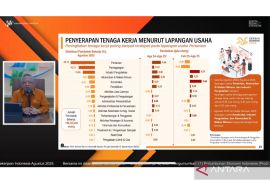At a press conference in Jakarta, Friday, BPS Head Suhariyanto highlighted high growth clocked by the ICT sector, at 10.58 percent, in 2020 in line with the increase in demand from the public.
"This sector is growing higher because of consumer demand due to WFH (Work From Home). The 10.58-percent growth is stronger than the 9.42-percent recorded in 2019," he stated.
Meanwhile, Suhariyanto noted that the health services and social activities sector had also recorded a growth of 11.6 percent in 2020 as compared to 8.69 percent in 2019 due to the disbursement of COVID-19 payments for health workers.
"In addition, this growth is supported by increased revenues from hospitals, clinics, and health laboratories for COVID-19 services," Suhariyanto stated.
Other business sectors that also recorded positive growth during 2020 and helped the economy were agriculture, forestry and fisheries that grew 1.75 percent; financial services and insurance, 3.25 percent; education services, 2.63 percent; real estate, 2.32 percent; and water supply, 4.94 percent.
"The agricultural sector grew 1.75 percent, driven by the production of higher secondary crops, with 1.72 percent for cassava and 5.45 percent for green beans. Moreover, horticultural production rose, with 8.38 percent for bananas, 2.86 percent for mangoes, and 12.33 percent for bird's eye chili," he noted.
Even so, the business fields that contributed the largest to GDP were still experiencing contraction and negative growth in 2020, specifically the processing industry, at minus 2.93 percent; trade, minus 3.72 percent; construction, minus 3.26 percent; and mining and quarrying, minus 1.95 percent.
"The processing industry is still impacted by a decline in LNG production, at minus 6.63 percent; cars, minus 46.37 percent; motorcycles, minus 40.21 percent; and cement, minus 9.26 percent. Trade is also affected by a decline in car sales by minus 48.35 percent; motorcycles, minus 43.57 percent; spare parts, minus 23 percent; and retail, minus 12.03 percent," Suhariyanto remarked.
During this period, business fields that recorded the deepest contraction were the transportation and trade sector that grew negatively by 15.04 percent and accommodation and food and beverage, at minus 10.22 percent.
Suhariyanto attributed the high contraction in the accommodation and food and beverage sectors to the hotel occupancy rate that declined by 39.75 percent, the number of foreign tourist visits that dropped by 75.03 percent, and the closure of hotels and restaurants during the COVID-19 pandemic.
The BPS had earlier noted that Indonesia's economy was experiencing a cumulative slowdown and contraction by 2.07 percent (yoy) in 2020 as a result of the COVID-19 pandemic that hit almost the entire world.
Despite continued contraction and negative growth, the economy has shown signs of improvement after contracting by 5.32 percent and 3.49 percent respectively in the second and third quarters of 2020.
This "upward" trend is the result of the government's efforts to constantly provide a spending stimulus and remind the public to follow health protocols and about the discovery of vaccines. Related news: Indonesian economy contracted 2.07 percent in 2020: BPS
Related news: Govt optimistic of 5% growth despite large-scale social restrictions
EDITED BY INE
Translator: Satyagraha, Azis Kurmala
Editor: Suharto
Copyright © ANTARA 2021












